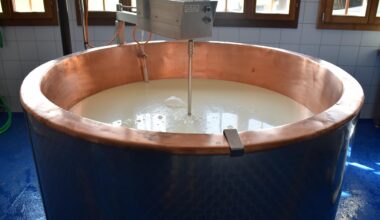Common Nutrition Mistakes in Muscle Gain
When it comes to gaining muscle, many individuals often overlook the importance of nutrition. A common mistake made is not consuming enough calories to support muscle growth. Focusing on lifting weights while neglecting your diet won’t yield results. To build muscle effectively, you need to eat more calories than you burn. Prioritizing protein intake is vital; however, many overlook this aspect during their weight training sessions. Aim for at least 1.6 grams of protein per kilogram of body weight daily. This ensures your muscles have the necessary nutrients for recovery and growth. Furthermore, timing your meals can significantly impact your performance. Many fail to consume a balanced meal before and after workouts, which can slow recovery. Additionally, hydration plays a crucial role. Dehydration can impair performance. Many forget to drink sufficient water throughout the day. Lastly, skipping meals or relying on meal replacements can lead to nutrient deficiencies. Plan your meals ahead to ensure you’re getting a balanced diet rich in calories and nutrients. You must pay attention to your body’s needs and make necessary dietary adjustments to maximize muscle gain.
Ignoring Carbohydrates
An often overlooked macronutrient in muscle gain is carbohydrates. Some individuals mistakenly fear carbs, thinking they will hinder their progress. The truth is that carbohydrates are vital as they provide energy for your workouts. Energy is crucial for optimal performance, especially when lifting heavy weights. Consuming complex carbohydrates, such as oats, brown rice, or sweet potatoes, can help replenish glycogen stores after workouts. This not only improves recovery but also supports subsequent training sessions. It’s essential to understand the role of carbohydrates in protein synthesis as well. When combined with protein, carbohydrates facilitate the transport of amino acids into muscles. Skipping carbohydrate-rich foods can lead to fatigue and decrease your ability to perform maximum efforts in the gym. Another frequent error is consuming simple sugars excessively instead of nutrient-dense options. It is advisable to limit sugary drinks and snacks in favor of whole foods containing fiber. Fiber helps regulate digestion and overall health, so focusing on whole grains, fruits, and vegetables is vital. Our bodies require a balanced intake of macronutrients, ensuring that carbohydrates, protein, and fats work synergistically for optimal muscle growth.
Another significant mistake individuals make is neglecting healthy fats in their diet. Many people perceive fats as detrimental to muscle gain, yet they play an essential role in hormone production and overall health. Hormones like testosterone are crucial for muscle development, and dietary fats support their synthesis. Incorporating sources of healthy fats is vital in achieving balanced nutrition. Foods such as avocados, nuts, seeds, and olive oil are excellent options. These fats provide essential fatty acids that our bodies cannot produce alone. Not only do healthy fats support muscle growth, but they also serve to enhance satiety and overall dietary compliance. Individuals often struggle with adhering to rigid dieting rules which can lead to binge eating. Including healthy fats in your meals can help regulate hunger levels and improve your diet’s sustainability. Additionally, it’s crucial to avoid trans fats and excessive saturated fats from processed foods, as they can be detrimental to muscle gain. This can be counterproductive in your quest for muscle growth. Optimizing your fat intake alongside proteins and carbohydrates can result in overall better health and improved muscle gain performance, which is vital to long-term achievement.
Failing to Track Progress
Tracking progress is another much-neglected component in muscle gain nutrition. Many individuals start a new diet or training program with enthusiasm but fail to monitor their diets effectively. Tracking your macronutrient intake can provide invaluable insights into what you need to modify for improved results. Utilizing apps or journals can help you keep a record of your daily caloric and nutrient intake. This is important because it allows you to pinpoint micronutritional deficiencies and adjust accordingly. Moreover, many neglect to measure their body composition regularly. Tracking measurements helps visualize progress over time, maintaining motivation. Another crucial aspect is setting specific goals; aim to gain a certain amount of weight or muscle within a set timeframe. These goals lead to strategic planning for your nutrition. Some individuals forget to celebrate small wins along the way, thinking only about large goals. Recognizing and appreciating the incremental achievements can significantly boost morale. It’s essential to stay adaptable; if you’re not seeing the desired results, don’t hesitate to re-evaluate and make necessary changes. Consistency is vital, but progress tracking provides valuable information needed to optimize your muscle-gaining journey.
An often disregarded aspect of muscle gain nutrition is the importance of post-workout recovery meals. Many individuals overlook this phase and miss a critical opportunity for muscle repair and growth. After exercising, consuming a meal rich in both protein and carbohydrates is essential. This combination helps replenish glycogen stores and kickstarts the muscle recovery process. Moreover, many do not understand the significance of nutrient timing; a post-workout meal should ideally be consumed within a 30 to 60-minute window after training. This meal will provide your body with the necessary nutrients to recover effectively. Another mistake is focusing solely on protein without considering carbohydrates, which can lead to insufficient energy replenishment. Including fruits or whole grains along with your protein source can enhance recovery. On top of that, failing to include hydration during this phase can also hinder the recovery process. Dehydration can slow muscle recovery and can impede performance in subsequent workouts. Incorporating a post-workout recovery shake or balanced meal is vital for maximizing the muscle gain effects from your training. Overall, strategic meal planning around workouts can seriously expedite muscle growth and recovery.
Overemphasizing Supplements
One of the most prevalent mistakes in nutrition for muscle gain is an overemphasis on supplements. Many individuals believe that taking protein powders or other dietary supplements will replace whole foods. This misconception can lead to inadequate nutrient intake, as supplements should complement a balanced diet. Whole food sources provide numerous nutrients that supplements often lack, such as vitamins, minerals, and fiber. Relying solely on supplements may create an imbalance in your diet. It’s also essential to understand that supplements are not a magic solution for muscle gain. Instead, they can serve as convenient options when whole food sources are unavailable. Prioritizing whole foods such as lean meats, dairy, legumes, and nuts should be your primary strategy. Supplements can also be costly, leading to unnecessary spending if they’re not part of a well-rounded dietary plan. Education on proper supplement use can help individuals make informed decisions about what to incorporate. If you must consider supplementing, choose high-quality products that have been tested for purity. Always consult with a healthcare professional before beginning a new supplement regimen to ensure it’s suitable for your needs and goals.
Finally, many individuals overlook the role of variety in their diets, making another critical mistake. Consuming the same foods repeatedly can result in nutrient deficiencies, which can hinder muscle growth. A diverse diet ensures you get a range of essential nutrients necessary for optimal performance and recovery. Tailoring your diet by including different sources of protein, carbohydrates, and healthy fats can offer a broader spectrum of vitamins and minerals. For instance, incorporating plant-based proteins, lean meats, fish, dairy, and legumes can substantially enhance protein intake while providing essential nutrients that differ across food sources. Additionally, varying your carbohydrate sources, such as fruits, whole grains, vegetables, and legumes, contributes to improved digestive health and overall vitality. Exploring different cooking methods and food combinations can help keep meals exciting and enjoyable. Not only does this improve compliance with your diet, but it also ensures you’re addressing various nutritional needs. Eating a wide variety of whole foods supports energy levels, enhances recovery, and optimizes overall health. Ultimately, a varied and balanced diet is key to successful and sustainable muscle gain.
Common Nutrition Mistakes in Muscle Gain





